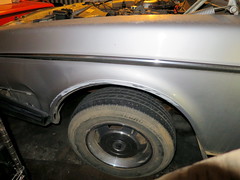- “Old deeds threaten Buffalo, NY hotel development” — Wikinews, November 21, 2006
- “Proposal for Buffalo, N.Y. hotel reportedly dead: parcels for sale “by owner”” — Wikinews, November 16, 2006
- “Contract to buy properties on site of Buffalo, N.Y. hotel proposal extended” — Wikinews, October 2, 2006
- “Court date “as needed” for lawsuit against Buffalo, N.Y. hotel proposal” — Wikinews, August 14, 2006
- “Preliminary hearing for lawsuit against Buffalo, N.Y. hotel proposal rescheduled” — Wikinews, July 26, 2006
- “Elmwood Village Hotel proposal in Buffalo, N.Y. withdrawn” — Wikinews, July 13, 2006
- “Preliminary hearing against Buffalo, N.Y. hotel proposal delayed” — Wikinews, June 2, 2006
- “Hotel development proposal could displace Buffalo, NY business owners” — Wikinews, February 17, 2006
Sunday, March 26, 2006
Buffalo, New York —For the second weekend in a row, demonstrators protested the Elmwood Village Hotel proposal on the proposed site.
The Elmwood Village Hotel is a proposed hotel by Savarino Construction Services Corporation and is designed by architect Karl Frizlen of the Frizlen Group. It is to be placed on the corner of Elmwood and Forest Avenues in Buffalo and will require the demolition of at least five properties (1109-1121 Elmwood).
The proposal also required that all five properties, including 605 Forest, be rezoned to a “C-2” zone, or a “special development plan.” The rezoning was passed by Buffalo’s Common Council on March 21, 2006.
Russell Smith, owner of the Six Nation’s Gift Shop at 1121 Elmwood, also participated in the protest.
“I am a Native American and we opened a Native American gift shop and we are just brand new [and just] opened. Having started out a business for the first time, and it the only Native American shop in the city, and I do not see the use of any hotel, especially at this district. The Elmwood Strip is pretty well established. Some of these people have been here a long while you know and they’re [Savarino Construction] disrupting their livelihood,” said Smith to Wikinews.
When Smith was asked if he was going to be in any of the shops in the new hotel he replied, “we don’t have the option of getting into the hotel or any of the shops that are going to be there. We haven’t [had] any idea that they [Savarino] were even planning to tear these buildings down to put a hotel here until we had moved in. I think thats a little unfair.”
Former City of Buffalo Mayor Anthony Masiello was asked to sign the petition to stop the hotel when he walked by, but he declined saying, “I respect what you are doing, but I am for the hotel.”
Despite the cold weather, at least 45 people showed up to walk the picket line.
For the moment, no further protests have been scheduled, pending the final decision on the hotel proposal by the city’s Planning Board which meets Tuesday, March 28, 2006. The meeting begins at 8:00am and will be held in room 902 on the 9th floor of City Hall in downtown Buffalo.
On Saturday morning several individuals attended a meeting with a lawyer to see what could be done, if anything, about the proposal and about Hans Mobius, former Buffalo mayoral candidate and owner of the properties to be demolished at 1109-1121 Elmwood.
One of the attendees, Nancy Pollina, co-owner of Don Apparel with Patty Morris, stated that “there is a case” but that she is likely unable to afford the large attorney’s fees. Pollina reports that she is looking into a “legal fund.”
Some of the affected are considering going to the New York State Supreme Court pro se to seek an injunction.
Some tenants of Mobius’s buildings have accused him of being a “slumlord” and claim that he “intentionally neglected” his properties with the intention of selling. Mobius, who has owned the properties for about 20 years, tried in 1995 to sell them to a developer who wanted to build a Walgreens Drugstore on the same site as the proposed hotel.
Mobius is expected to appear in housing Court on April 11, 2006. He has not returned any phone calls from Wikinews.
